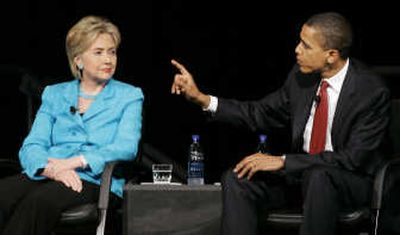Democrats spar over donations from lobbyists

CHICAGO – The Democratic presidential candidates appeared together for the first time Saturday before a major gathering of the “netroots” – online political activists who hope to remake American politics – in a debate that produced a sharp exchange over donations from lobbyists.
Front-runner Hillary Clinton took barbs from two of her opponents and boos and hisses from some of the audience of 1,500 bloggers and Internet stalwarts at the Yearly Kos Convention when she refused to reject contributions from individuals who lobby the federal government.
Clinton said she had to raise money to be competitive and that her record of 35 years of public service proved she would fight for regular Americans. “I have stayed true to my core principles,” Clinton said. “A lot of those lobbyists, whether you like it or not, represent real Americans” like nurses and teachers and others who need a voice in the halls of government.
Sen. Barack Obama and former Sen. John Edwards jumped on Clinton for that position in what was the sharpest exchange of the 90-minute debate in an auditorium at the sprawling McCormick Place Convention Center.
“I disagree with the notion that lobbyists don’t have disproportionate influence,” Obama said, noting that Clinton herself could not pass a health-care reform measure when she was first lady because of massive opposition from pharmaceutical and insurance lobbyists. “You can’t tell me that money did not have an influence. You can’t tell me that money was for the public good. They have an interest.”
Obama has pledged to disdain donations from federally registered lobbyists, while Edwards has staked out that same position since he represented North Carolina in the Senate. Both men are trailing Clinton in national polls.
To illustrate his point that lobbyists represent special interests rather than those of ordinary citizens, Edwards asked for a show of hands of how many in this room had a Washington lobbyist. Noting that only a handful in the audience raised their hands, he told the audience, “You are not represented by Washington lobbyists. We need to cut these people off.”
Clinton chose not to counterattack – by raising questions about her opponents’ funding sources, for example – or to offer a response when Edwards needled her as too passive on pushing for health care reform.
But two long-shot candidates who were not targeted by the barbs delivered a counterpoint. Rep. Dennis Kucinich challenged the source of Edwards’ contributions, asking if he would also call for a ban on fundraising “to also include Wall Street hedge funds.” Former Alaska Sen. Mike Gravel won laughter and nods of approval when he said: “All politicians walk in the mud … because they all have to raise money.”
The seven candidates attending – only Sen. Joseph Biden was absent – offered essentially the same long-range solution to the problem of special interest political donations. All raised their hands to indicate they favor public financing of political campaigns.